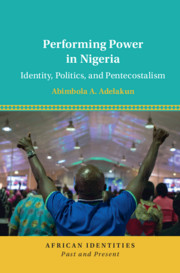Book contents
- Performing Power in Nigeria
- African Identities: Past and Present
- Performing Power in Nigeria
- Copyright page
- Dedication
- Contents
- Acknowledgments
- Introduction: Power Identity: Politics, Performance, and Nigerian Pentecostalism
- 1 Demons and Deliverance: Discourses on Pentecostal Power
- 2 “What Islamic Devils?!”: Power Struggles, Race, and Christian Transnationalism
- 3 “Touch Not Mine Anointed”: #MeToo, #ChurchToo, and the Power of “See Finish”
- 4 “Everything Christianity/the Bible Represents Is Being Attacked on the Internet!”: The Internet and Technologies of Religious Engagement
- 5 “God Too Laughs and We Can Laugh Too”: The Ambivalent Power of Comedy Performances in the Church
- 6 “The Spirit Names the Child”: Pentecostal Futurity in the Name of Jesus
- Conclusion: Power Must Change Hands: COVID-19, Power, and the Imperative of Knowledge
- Select Bibliography
- Index
1 - Demons and Deliverance: Discourses on Pentecostal Power
Published online by Cambridge University Press: 29 October 2021
- Performing Power in Nigeria
- African Identities: Past and Present
- Performing Power in Nigeria
- Copyright page
- Dedication
- Contents
- Acknowledgments
- Introduction: Power Identity: Politics, Performance, and Nigerian Pentecostalism
- 1 Demons and Deliverance: Discourses on Pentecostal Power
- 2 “What Islamic Devils?!”: Power Struggles, Race, and Christian Transnationalism
- 3 “Touch Not Mine Anointed”: #MeToo, #ChurchToo, and the Power of “See Finish”
- 4 “Everything Christianity/the Bible Represents Is Being Attacked on the Internet!”: The Internet and Technologies of Religious Engagement
- 5 “God Too Laughs and We Can Laugh Too”: The Ambivalent Power of Comedy Performances in the Church
- 6 “The Spirit Names the Child”: Pentecostal Futurity in the Name of Jesus
- Conclusion: Power Must Change Hands: COVID-19, Power, and the Imperative of Knowledge
- Select Bibliography
- Index
Summary
The expulsion and defeat of demonic forces is integral to Pentecostal practice. This chapter, Demons and Deliverance: Discourses on Pentecostal Character, uses close readings of fictional performances allied to the Pentecostal movement to lay out Pentecostalism’s history and its preoccupation with power. Understanding Pentecostal performance of power identity entails not just looking at the practices conducted in the church or the structure of their religious activities, but also at theatrical activities and drama productions about demonic encounters staged to boost Pentecostal faith. The mediatized accounts of spiritual warfare narrated by Pentecostal drama ministers are strategic to the reading of the Pentecostal social history and ritual actions. This chapter chronicles the Pentecostal trajectory and their demonstrated desire for power through two television dramas about deliverance from satanic attacks, Agbara Nla (The Ultimate Power) and Abejoye (The Kingmaker). Both were produced by the same Christian film company, the Mount Zion Faith Ministry, across about three decades. The differences in how both dramas capture the performance of exorcism are instructive in understanding how far the Pentecostal faith has traveled as a social practice and how they have achieved their power identity through a drawn-out period of time.
- Type
- Chapter
- Information
- Performing Power in NigeriaIdentity, Politics, and Pentecostalism, pp. 29 - 65Publisher: Cambridge University PressPrint publication year: 2021



